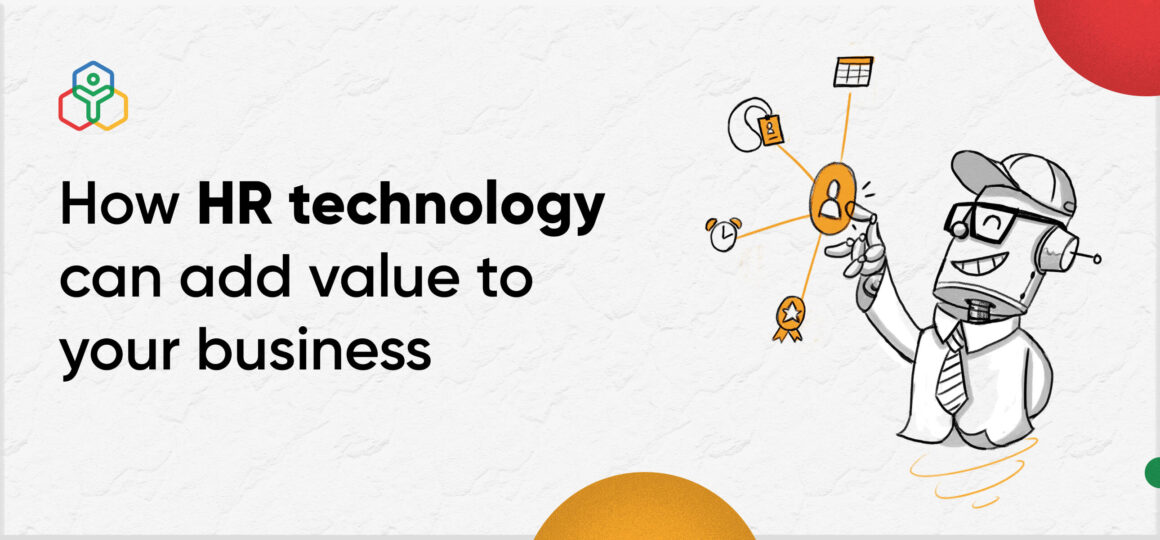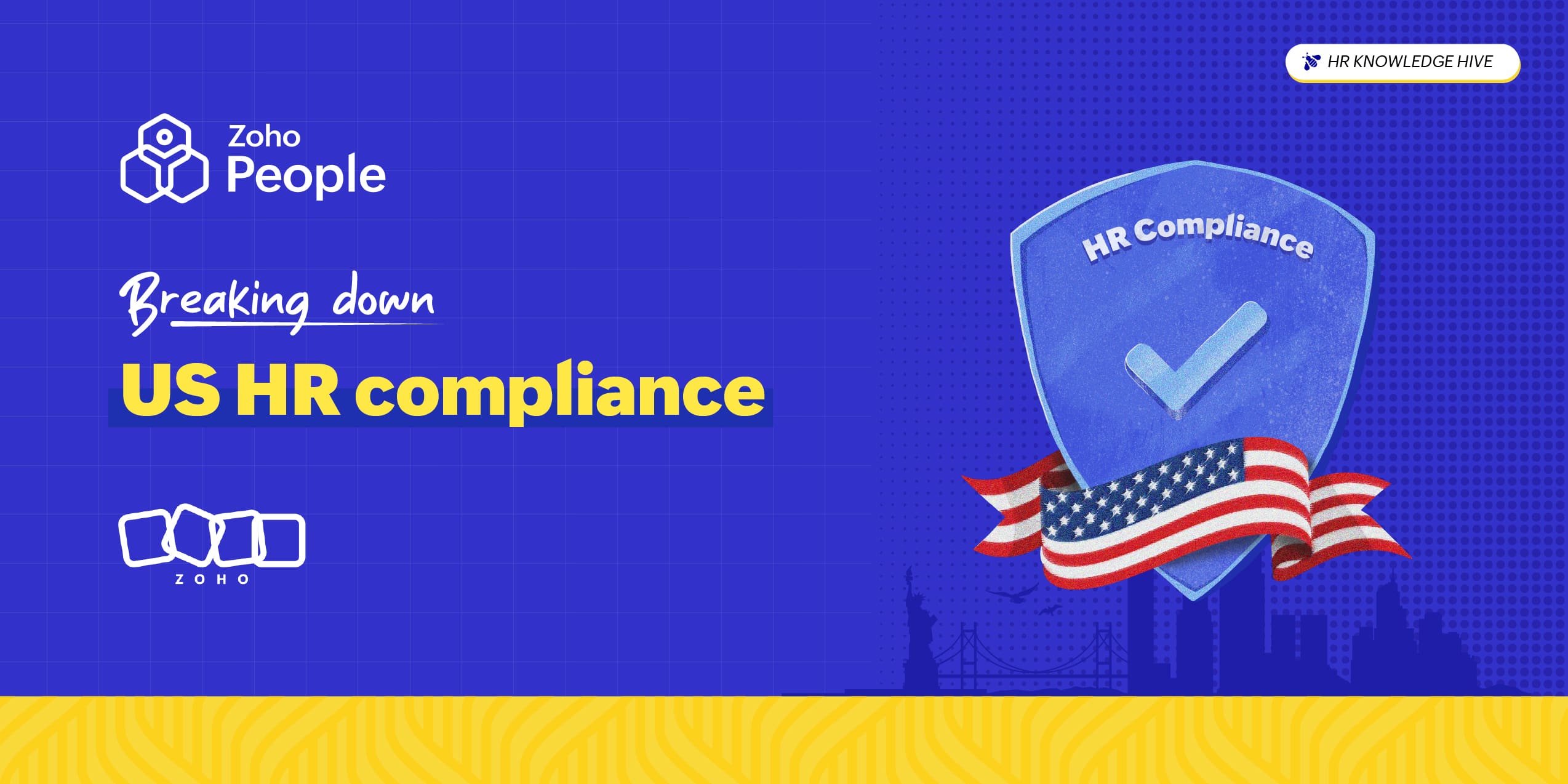- HOME
- More
- HR for SMBs
- How HR technology can add value to your business
How HR technology can add value to your business
- Last Updated : January 8, 2026
- 3.8K Views
- 6 Min Read

A company’s HR department has the potential to convert an organization’s talent into financial performance and market value. However, with numerous processes to manage, multiple tasks to handle, and never-ending paperwork to sort through, HRs are often stuck in a spiral that can be hard to break.
A survey from CareerBuilder found that,
Almost 14 hours a week is spent on manually completing tasks that can be automated.
With the war for talent increasing fiercely and employee retention being a crucial element, HR needs to turn towards technology and agile processing more than ever before.
Tech in HR—a digital revolution
Technology has transformed the way HR oversees a workforce, stores information, and manages processes. It has dramatically changed how things function in a conventional system, providing the space to move away from traditional five-year plans to create innovative ideas and manage and engage the modern workforce, which today holds multi-generational talent. Some of the common reasons organizations turn towards technology is cost-effectiveness, flexibility, and ease-of-use.
Although technology has diverse impacts on a business, it’s also a massive undertaking. So it’s important to understand how you can leverage HR technology and derive value from it if you are to choose software that gives the best ROI.
Automation: streamlining HRIS
HR staff typically spend the most time managing core HR processes like hiring and recruitment, employee onboarding, attendance, time off, payroll, expenses, and benefits, among others. These processes can be taxing and time-consuming, often hindering the HR team from focusing on their employees and their changing needs.
Let’s take for example the onboarding process. From the moment a candidate is hired, collecting and tracking all the necessary candidate information and supporting documents are done online. The offer letter is digitally signed and sent by the candidates and all the paperwork is completed before the first day.
Research by SHRM found that,
Organizations with a digital onboarding process experienced 60% better productivity from new hires.
This means a streamlined process helps your HR staff provide new employees with a good orientation and other first-day things that’ll assist them in getting familiarized with the workplace while still keeping all administrative activities on track. Systems, like SaaS applications, are easy to set up and deploy even at big enterprises.
So while you’re implementing a human resources management system (HRMS), make sure your core processes are completely automated and tightly integrated so data flows well and frees your HR department to focus on things that matter.
Customizability—software that works your way
There are hundreds of software vendors on the market promising solutions that will dramatically solve HR problems. But the most important question you should consider is which one has the right features to make a difference in your organization.
Every company is different, and so are their people requirements. Make sure your HR software caters to your organization’s unique business needs and not the other way around.
A flexible, customizable software solution builds processes in a way that reflects the culture and practices of the company, enabling efficiency and quick HR service delivery. The ability to create custom HR services with a carefully curated framework of steps, to customize leave policies to the organization’s needs or build customized workflows all make your HR go agile.
Configurability
Software is designed to make life easier, so it should be easy to deploy and configure without your HR staff having to be tech-savvy. While easy-to-use software gives employees a good user experience through a simple user interface, configurability means going even further.
HR trends are ever-evolving and change is inevitable. Keeping up with the pace is equally crucial. This is when an adaptable technology can increase efficiency. You want HR tech that can help you create processes for different scenarios. For example, it can help you perform a pilot operation, and—if the results are promising—enables you to roll it out to your entire organization in a matter of a few days.
HR analytics—reading between the lines
HR is a treasure trove of data that, when used in the right way, can create an effective impact on business performance. When processes are streamlined and information is accurate, analyzing key performance indicators (KPI) enables organizations to predict trends and identify opportunities for change and re-evaluation of processes and policies.
Let’s say for example that you analyze the resignation rates. What technology can do is analyze the resignation of every department, role, or location and say who’s leaving and why. Are they top performers, managers, or new hires? The correlative result translates into developing or iterating your retention strategies, which ultimately results in reduced cost and drives business value.
Optimizing workforce efficiency: performance and engagement
Business success and retention boils down to one important factor―optimizing your workforce to the best of their skills and abilities. HR tech gives an upper hand by intuitively driving employee performance and helping HR in training and developmental opportunities.
A Mercer survey found that a whopping 95% of managers were dissatisfied with their performance management processes.
This alarming stat could be because of:
- Ineffective evaluation metrics
- Managers not being aware of the required skill sets and competencies of a job role
- The sheer nature of filling out forms and manually checking on every employee’s performance
Tech simplifies the evaluation phases. It helps you plan and track parameters like goal completion, the progress of KRAs, and skillsets and competencies. This helps employees stay on top of their day-to-day tasks and managers be aware of every employee’s contribution. It enables managers to seamlessly identify skill gaps and suggest upskilling and reskilling of the existing workforce.
Feedback
Feedback plays a nuanced role in employee development and engagement. Accurate and timely feedback helps employees work through their shortcomings and passionately contribute to the organization. It’s natural to look up to immediate managers for feedback, but it shouldn’t just follow the top-down approach. Feedback and learning should also come from peers and subordinates.
HR tech enables 360-degree feedback where employees and managers can provide and receive feedback all year long, which can later also be used for appraisals.
Consolidation
Consolidating all the aspects of performance into actual assessments is often a nerve-racking process. But technology automates these processes—allowing managers to rate performance—and enables self-appraisals and multi-rater evaluation. It intuitively normalizes pay hikes and provides consolidated data.
What’s great about technology is that you don’t just get the processes done, but you also get plenty of insights about your workforce. For example, the nine-box matrix helps managers identify where an employee’s performance stands so they can guide them through training and developmental opportunities.
Optimizing the mobile workforce
A study by Strategy Analytics found that 42.5% of the global workforce will go mobile by 2022.
Cloud HR technology can help you build successful mobile teams without a reduction in their engagement and productivity. HR tech can keep all employees on the same page with collaboration tools, instant notifications, and productivity tracking on the go. Preparing for the future means providing tools and technology that’s future-ready.
The service experience
With the digital transformation of HR, we’ve shifted the focus from merely automating processes to enhancing employee experiences. Catering to a multi-generational workplace and increasing Gen-Z employees means organizations compete to ensure development, transparency, and fairness.
HR tech empowers employees to take control of their information and what they learn while enabling them to work from anywhere and have access to their information anywhere and at any time.
Final thoughts
As you can see, HR technology plays a major role in automating HR activities, but it also plays a vital role in shaping culture, improving engagement, cementing the employer brand, and building a nurturing work environment. Choosing the right HR software with the above attributes will have a direct impact on your bottom line, adding more value to your business while improving employee satisfaction and HR productivity.
 Princy
PrincyProduct Marketer at Zoho People.


